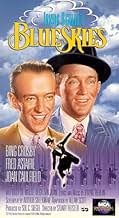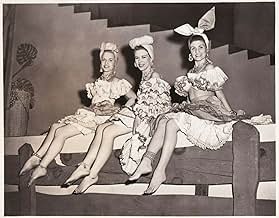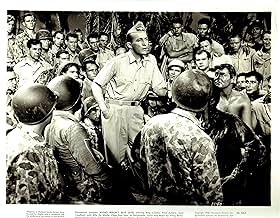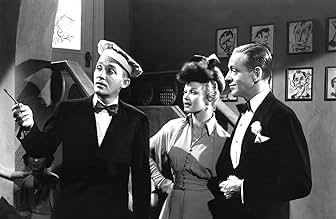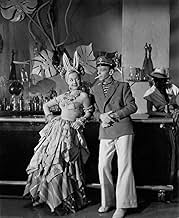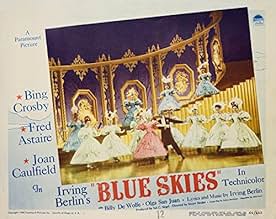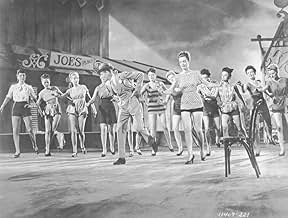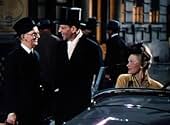Ajouter une intrigue dans votre langueAn ex-dancer and New York radio star narrates his love story for a band singer who loved a self-centered man who was unable to commit to his nightclub business or his family.An ex-dancer and New York radio star narrates his love story for a band singer who loved a self-centered man who was unable to commit to his nightclub business or his family.An ex-dancer and New York radio star narrates his love story for a band singer who loved a self-centered man who was unable to commit to his nightclub business or his family.
- Directors
- Writers
- Stars
- Nommé pour 2 oscars
- 3 victoires et 3 nominations au total
- Dancer
- (uncredited)
- Dolly
- (uncredited)
- Dancer
- (uncredited)
- Flapper
- (uncredited)
- Dancer
- (uncredited)
- Restaurant Patron
- (uncredited)
- Dancer
- (uncredited)
- Dancer
- (uncredited)
- Showgirl
- (uncredited)
Avis en vedette
I believe that this film shows the different "style" of the studios. Had this been made at M-G-M, if probably would have been great, at Paramount it falls flat. "Lady in the Dark" was another Paramount opus which had a similar fault.
The story of this love triangle is backed up by one Irving Berlin song after another - there is a lot of music, some fine singing by Crosby and tremendous dancing by Astaire. This was to be his last film but his retirement only lasted a couple of years. He worked in film until 1977 and continued working in television and doing voiceovers until 1981; he died in 1987. In the late '50s, he did two dance specials on television, and he did one in 1968. Was he dancing at the age of 69? Probably.
The movie doesn't really hang together. The production values are great, but the story is trite, and there aren't enough fabulous numbers. Astaire does "Puttin' on the Ritz," which is the height of the film, also "Heat Wave," and with Crosby, "A Couple of Song and Dance Men." There is a section during World War II where Crosby sings some of his Berlin standards, "This is the Army, Mr. Jones," "White Christmas," and "Any Bonds Today?" The beautiful "Always" is done as a chorus number, as is "How Deep is the Ocean," with Crosby sometimes singing along.
Having heard Crosby when he had something to prove back in the early '30s, I can never be content with his crooning, except perhaps in some parts of "Holiday Inn." Astaire is the one who makes this film worthwhile at all. See it for him and for some of the music and musical numbers. Ignore the story.
At any rate, here both male stars are in love with the same woman (Joan Caufield in this case). I like the pairing of Astaire and Crosby. Their respective talents play well off each other, especially in their "A Couple of Song and Dance Men" performance. There are so many songs that show up in Irving Berlin musicals that I didn't even realize were Irving Berlin songs. Crosby performs "(I'll See You in) C-U-B-A." I must say that I prefer Desi Arnaz' rendition. Crosby sang it too slow for my tastes. One of the supporting players, Billy deWolfe, was funny enough. However, I wasn't a fan of his shtick when he was performing sans Crosby or Astaire. He had one bit that went on for quite some time. He was portraying "Mrs. Murgatroyd." I was surprised that his routine was allowed to go on so long since it was just not that amusing. I did some research and found out that deWolfe was a popular comedian in the day and "Mrs. Murgatroyd" was one of his popular characters. Knowing that information, it put his performance into context and it helped make sense out of the attention his act is given in the film.
The showstopping number was Fred Astaire's "Puttin' on the Ritz" number. The rest of the film is average, but Astaire's number makes the entire film worth watching. It is fantastic and a complete joy to watch. The filming and special effects involved in this routine are excellent when considering the production date. There was also another rendition of "White Christmas" which is always enjoyable.
Oh, do notice that the lyrics to "Puttin on the Ritz", which was written for the 1930 film of the same name, have been changed to remove any perceived racial elements. The original lyrics talked about well dressed African American servants out on their night off. The version sung here mentions people who are "dressed up like a million dollar trouper trying hard to look like Gary Cooper". Not many people in 1930 would have known who Gary Cooper was. He was not a big star yet. At any rate, this film is where the change is first made.
I'd recommend it, but just don't expect "Holiday Inn".
It seems that the three are Vaudeville friends. Fred is head-over-heels for Joan--and Joan is in love with Bing (who is reasonably indifferent for a while). Eventually, Bing and Joan marry--and you see VERY little of Fred through much of the rest of the film. It's a shame, as I really watched this movie for him more than anything else. Eventually, the new marriage goes on the rocks because Bing is too focused on success--much to the detriment of family life. Can these folks somehow make a go of it? Now considering it's a Hollywood film, I'd say the chances are pretty great they will--though if these were real people, you'd advise to Joan to get a divorce and be done with the louse! And what about poor Fred?! What will happen with this really swell guy? Well, what REALLY happens took me aback--as it appears as if she got BOTH of them by the end of the movie! "Blue Skies" is a film weighted very heavily towards singing and Crosby's talents. So, if you love his singing, the film will no doubt be more enjoyable--especially when he sings an abbreviated version of "White Christmas" (who could dislike that?!). However, I do think the film has one or two too many musical numbers and could have used from a bit more plot. As for me, seeing Fred get to play the #3 man and only dance a bit was sad--though his number "Putting on the Ritz" was terrific. One or two more of his numbers might have made the film a bit better. As for the story, it's pretty clichéd but enjoyable. A decent film but it could have been better--particularly if they'd made Bing's character more likable.
And there's the added treat of music by one of the legendary composers. Irving Berlin provides his beautiful songs, including the Oscar-nominee "You Keep Coming Back Like a Song." Fred Astaire does his famous "Puttin on the Ritz" number, while Bing sings the title tune. The duo work well together as they did on "Holiday Inn" four years earlier.
Billy De Wolfe has some funny moments in songs and sketches.
Overall, a colorful and entertaining musical. Don't listen to those who'd turn you away just because the plot is kinda thin.
What more could you want?
Le saviez-vous
- AnecdotesAfter Fred Astaire announced his retirement before completing this film, New York's Paramount Theater generated a petition of 10,000 names to persuade him to come out of retirement.
- GaffesAt the beginning of the movie, which is just after World War I, the Crosby character tells the De Wolfe character to do his Frankenstein routine. The Frankenstein character he does is based on Boris Karloff's 1931 version which some ten years or so in the future. At that time in the movie Frankenstein was just a creature in Mary Shelly's book.
- Citations
Jed Potter: Song and Dance Man.
Johnny Adams: Song and Dance Man, that's right.
Jed Potter: He didn't remember it then, how could he know it now?
Johnny Adams: Oh, get out, I bet I could do it right now, the whole thing.
- ConnexionsFeatured in The Dick Cavett Show: Fred Astaire (1970)
- Bandes originalesA Pretty Girl Is Like a Melody
Words and Music by Irving Berlin (1919)
Sung by Fred Astaire
Danced by Fred Astaire, Joan Caulfield, chorus
Meilleurs choix
- How long is Blue Skies?Propulsé par Alexa
Détails
- Date de sortie
- Pays d’origine
- Langues
- Aussi connu sous le nom de
- Blau ist der Himmel
- Lieux de tournage
- société de production
- Consultez plus de crédits d'entreprise sur IMDbPro
Box-office
- Budget
- 3 000 000 $ US (estimation)
- Durée1 heure 39 minutes
- Rapport de forme
- 1.37 : 1
Contribuer à cette page



